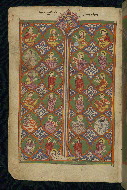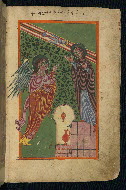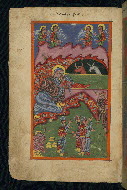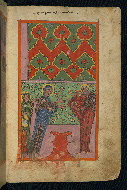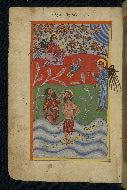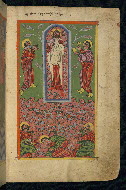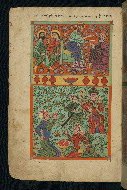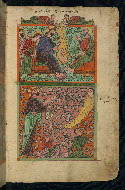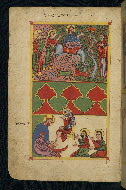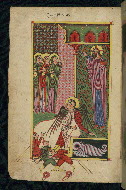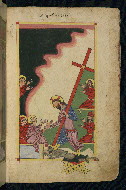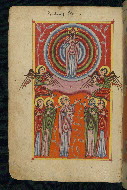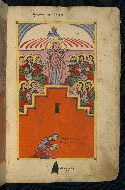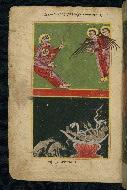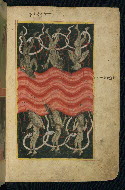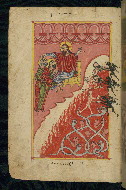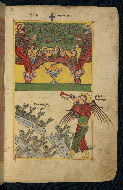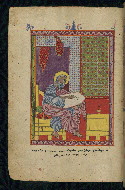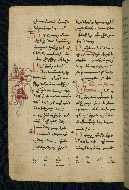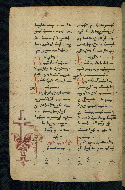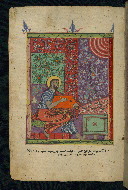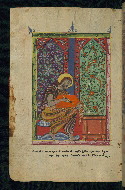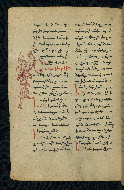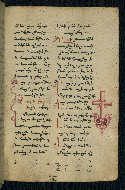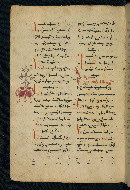Home > Digitized Walters Manuscripts
This document is a tranformation of a TEI P5 XML manuscript description incorporating images. If you have trouble reading special or non-Latin characters on this page, please make sure you have appropriate Unicode fonts installed and an up-to-date web browser.
Walters Ms. W.543, Gospels
Browse images (Browse images in a new window) | TEI in XML format
W.543
Gospels
Vernacular: Աւետարան
Authority name: Eusebius, Caesariensis, Bishop of Caesarea
This Armenian Gospel book was produced in 904 of the Armenian era (1455 CE) at the monastery of Gamałiēl in Xizan by the scribe Yohannēs Vardapet, son of Vardan and Dilšat, and was illuminated by the priest Xačʿatur. The priest Pʿilipos commissioned the manuscript as a memorial to himself, his parents Łazar and Xutʿlumēlikʿ, and other relatives listed in the colophon on fols. 300r to 301v. Pʿilipos is depicted on fol. 14v alongside his brothers Yusēpʿ and Sultanša, as they kneel before the Virgin and Child enthroned (Theotokos). The book contains twenty-six full-page polychrome miniatures, including four Evangelist portraits; ornately designed canon tables; four decorated incipit pages; numerous marginal miniatures of floral and faunal motifs; and nineteen marginal miniatures of biblical characters or allusions to biblical narratives.
1455 CE
Monastery of Gamałiēl in Xizan
Supplied name: Xačʿatur
Known as: Khatchatur
Supplied name: Yohannēs Vardapet, son of Vardan and Dilšat
Known as: Hohannes vardapet, son of Vardan and Dilshat
Book
Scriptural
The primary language in this manuscript is Armenian.
- In vernacular: Fol. 22v Յիշեցէք զստածող սուրբ աւետարանիս զտէր Կարապետն, զՆահապետն և զՄէլքէսէթ որդին, ամէն: Fol. 98v Յիշեցէք զստածող սուրբ աւետարանիս զտէր Կարապետն, և զՆահապետն և զՄէլքէսէթ որդին իւր, ամէն: Fol. 147r Զտէր Ըռստակէսն յիշեցէք ի տէր հանդերձ ծնօղիւքն իւրովք, ամէն: Fol. 151v Յիշեցէք զստածող սուրբ աւետարանիս զտէր Կարապետն, զՆահապետն և զորդին իւր զՄէլքէսէթն, ամէն, թվին ռ՟ճ՟ծ՟գ՟: (=1704). Fol. 234r Զստացող սորայ զվերջի զտէր Ըռըստակէսն և զծնօղն իւր զԱմիրջանն և զԳուլան փաշէն յիշեցէք և Աստուած ողորմի ասացէք և Աստուած ձեզ ողորմեսցի, ամէն: Fol. 235r Դարձեալ յիշեցէք և Աստուած ողորմի ասացէք տէր Կարապետին և որդոյն Նահապետին, և իւր որդոյն Մելքսէթին, որ գնեցինք զսուրբ աւետարան յիշատակ հոգւոց մերոց: Որք հանդիպիք սմա կարդալով կամ օրինակելով յիշեցէք և Աստուած ողորմի ասացէք տէր Կարապետին և որդոցն Նահապետին, և թոռ Մէլքէսէթին, և ամենայն արեան մերձաւորացն, ամէն: Fol. 300r Փառք անպարագիծ էին, այնմ որ ոչ են հետազաւտելի և ոչ զինչ էն, և ոչ զինչ պիտին, համբարձելոյն յամենայն մտաց սլացման: Գոհութիւն անզննին գոյին, որ է բան կնիք և անսահման էին: Փառաւորութիւն անպարիմանալի սեռին, որ է հոգի համագոյ էին, և փառակից բանին: Որ տրամադրեաց զմեղսամած մատունս տասանց, անարժան և տկար ոգւոյ, Յոհաննէս մակադրեալ անուամբ վարդապետ, այլ ոչ սահմանաւ և գործով, զի անուամբս միայն եմ: Գրեալ և կարգեալ զճառս երախտեաց աստուածագործ սքանչելեացն, զոր ճշմարիտն և Աստուածն բան միածին որդին Աստուծոյ, Յիսուս Քրիստոս, ’ի վախճան աւուրցս այսոցիկ կատարեաց զնշանս և զարուեստս: Որպէս զի որք ընթերցցին, ի միտ առցեն և ծանիցեն, թէ նոյն տէր է որ Մովսէսի հրամայեաց առնուլ գառն տարեւոր, եւ յիշել զերախտիս աստուածութեանն որ յԵգիպտոս: Նոյն և աստեցոյց մեզ յիշատակ չարչարանաց իւրոց: Որ ոչ միայն պէսպէս նշանաւք լուսաւորեաց, այլ և չարչարանաց և մահու համբերեաց: Զի գիտե- (Fol. 300v) լով զանարգանս տեառն մերում: Դարձ եղիցի ի մեղաց մերոց: Արդ կատարեցաւ աստուածախաւս աւետարանս ձեռամբ Յոհանէս բանախնդրի, ի խնդրոյ նորաբողբոջ քահանային տէր Փիլիպոսին: Եւ զոր ի վաղուց հետէ ցանկայր այսմ աստուածախաւս սուրբ աւետարանիս, և ետ գրել զսայ յիշատակ հոգւոյ իւրոյ և ծնօղաց իւրոց: Հաւրն Ղազարին և մաւրն Խութլու Մէլէքին, և եղբարցն Յուսէփին և Սուլտանշին զոր տէր Աստուած Իսրաէղի պահեսցէ զըսոսա անփորձ կենաւք ի յայսմ աշխարհիս, ամէն: Եւ արդ ես ունայնս ’ի բարեաց գործոց, Յոհաննէս վարդապետ, որ ձայնիւ բարձրացեալ և հոգով կորացեալ, ըստ իմում տկարութեանս գրեցի զսուրբ աւետարանս, անարժան և անարհեստ յարուեստ գրչութեանս, ի վանքս որ Գամաղիէլ կոչի, ընդ հովանեաւ առաքելոյս Գամաղիէլի և այլ սրբոցս որ աստ կան: Ի յառաջնորդութեան վանացս Յոհաննէս վարդապետի և Դաւիթ եպիսկոպոսի և այլ կրօնաւորացս, Յովաննէսին և միւս Յովաննէսին, և Յոհաննէսին և Մխիթարին, և մահդասու Սարգսին, և միւս Սարգսին, և Ղազարին և Կարապետին և Յոհաննէսին, որ յայսմ ամի առաջնորդ կարգեցաւ վանացս (Fol. 301r) զոր տէր Աստուածն Յիսուս Քրիստոս անփորձ և անարատ պահեսցէ զսոսա ընդ երկայն աւուրս, ամէն: Եւ արդ յայսքան և յայսպիսի բարեվայելուչ և մեծափառ սրբոցս գումար, բարեխաւս աշխարհի և ապաւէն ապաստանի, քաւութիւն մեղուցելոցս, զոր դիմեալ մեծաւ յուսով ետուն գրել զսուրբ աւետարանս յիշատակ հոգւոց իւրեանց և ծնաւղացն, զոր տէր Աստուած վայելել տացէ զսա սոցա ընդ երկայն աւուրբք, ամմէն: Արդ որք ճաշակէք յաստուածային բուրաստանէս և յամենալի սեղանոյս, յիշեցէք ի Քրիստոս զստացաւղ սուրբ աւտարանիս զՓիլիպոս քահանայն և Աստուած ողորմի ասացէք, ամէն: Արդ ես անարժան ի մանկունս եկեղեցոյ Յոհաննէս վարդապետս, ի յընդիր և ի ստոյգ աւրինակէ, կողկողագին պաղատանաւք և հառաչմամբ սրտիւ աղաչեմ զհանդիպողքդ այսմ աստուածախաւս մատենիս, յիշեցէք ի մաքրափայլ յաղաւթս ձեր զանարժան գրիչս զՅոհաննէս, և զծնողսն իմ զՎարդան և զԴիլշատ, և զհանգուցեալ եղբարքն իմ ի Քրիստոս զքաղցրիկ Յովաննէսն, և զնոր փեսայն զԽերապետն, որ տարաժամ մահուամբ փոխեցան ի Քրիստոս, և լի բերանով և բոլոր ստրիւ Աստուած ողորմի ասացէք, և Աստուած յիշողացդ ողորմեսցի, ամէն: Արդ գրեցաւ սուրբ աւետարանս ի թուաբերութեանս Հայոց ջ՟դ՟ (=1455) ի դառն և ի նեղ ժամանակիս, ի ղանութեան ամիրզայ Ջիհանսին, և ի մեր քուրդ ամիրիս ամիրզա Ղասըմիս, զոր տէր Աստուած անյախթելի պահեսցէ զսայ և քաղցրաց- (Fol. 301v) ուսցէ զսիրտ սորայ ընդդէմ քրիստոնէիցս, ամէն: Արդ ես, անպիտանս և ախմարս յամենեսին, մեղուցեալ և տառապեալ ծաղկողս Խաչատուր քահանայ, ծաղկեցի զսուրբ աւետարանս բազում պանդըխտութեամբ, ոչ վասն ընչից և վաճառոյ, այլ վասն սիրոյ և վասն միոյ տէր ողորմայի զոր ասէք ինձ յայսմ ատենի, արդ ով որ ասէ ինձ ողորմի, Աստուած նմայ ողորմեսցի, ամէն: Այլ և կրկին անկամ աղաչեմ յիշել ի Քրիստոս զամենեսեան որք երախտաւորք են ի սմայ և ունին մասն ողորմութեան ի սուրբ աւետարանս, և ետուն գրել զանունս իւրեանց ի սմայ, վասն որոյ գրեսցին նոքա ի դպրութիւն կենաց յերկինս, և առցեն զփոխարէնն ի Քրիստոսէ, ամէն: Ընդ սոցին և զիս զանարժան ըզՓիլիպոս քահանայ և զկողակիցն իւր և զեղբարքն իւր զՅովսէփն և զՍուլտանշէն և զկողակից սոցայ, և լի բերանով Աստուած ողորմի ասացէք, և որ ասէ զտէր ողորմին տէրն տացէ զիւր խնդրելին, ամէն: Դարձեալ կրկին անկամ աղաչեմ զձեզ յիշեցէք ի Քրիստոս զքեռիքն իմ զՄլուքն, ըզԴօլւաթշէն և զՍիւամոնն և զծնաւղ սոցա և Աստուած ողորմի ասացէք սոցա լի, ամէն: Fol. 302r [beginning missing] (ծ)նաւղոաց սոցին, հաւրն Սադաղին և մաւր Խութլու Մելէքին, և ամենեցուն որ աստ գրած յիշատակին, յիշեալ լիցին յաւրն ահեղին, դասեալ ի դասս աջակողմին, ի գալուստ սուրբ միածնին, ամպովք ընդ առաջ տեառն լինին, ի փողակոչ սուրբ ատենին, ծածկին լուսով թագաւորին, և ընդ սրբոցն պսակին, ամէն և եղիցին: Եւ որ ասէ զտէր որորմին, Յիսուս Քրիստոս հաւր միածին, աղաչանաւք Աստուածածնին, զխաղաղութիւն քո զերկնային, զողորմութիւն աստուածային, հեղ ի վերայ ասողի զտէր ողորմին, և առ հասարակ ժողովրդեանս, ամէն, ամէն: Fol. 302v Զվերջին ըստացող սուրբ աւետարանիս, զտէր Ըռըստակէսն, և զհայրն Ամիրջան և զմայրն զԳուլան փաշէն, և զեղբարքն զԽոջաջանն, զԲաբաջանն, զԹումաջանն, զՄիրիջանն, զԽաչատուրն, և զեղբօրորդիքն զԱմիրջանն, զԱղաջանն, զԱւետիքն, և զեղբօրդսերքն զՅիբաթսօլտանն, զԽանաղէն, և զՍօլթանն, և զհարսունքն զՋանաղէն, զԴօլւաթն, և զՍուլթանն: Յիշեցէք և Աստուած ողորմի ասացէք, և Աստուած ձեզ ողորմեսցի ի գալստեանն իւրում: Ամէն: Դարձեալ կրկին անգամ աղաչեմ յիշել ի տէր զտէր Ըռըստակէս բարի կրօնաւորն, որ ստացաւ զսուրբ աւետարանս յիշատակ հոգւոյ իւրոյ և ծնօղացն, հօրն Ամիրջանին, և մօրն Գուլանփաշէն, և սանահօրն ուսթայ Ղիաշին, և իւր որդյոյն Սախակուն, և կողակցին Մարգրտին, և դստերացն` Նուբարին, և Եղիսին, և հարսներացն Շաղդադին, և միւս Շաղդադին, և Եղիսին. որք հանդիք (sic) սմայ յիշեցէք և Աստուած ողորմի ասացէք նոցայ, և Աստուածն որ առատն է ի տուրս բարեաց ձեզ և մեզ ողորմսցի, ամէն: թվ. ռ՟կ՟զ՟ (=1617) Fol. 303r Ես աստուածասէր և բարեմիտ ծառայս Աստուծոյ Արիստակէս կրօնաւորս ըստացա զսուրբ աւետարանս և նոր նորոգել տուի յիշատակ հոգոյ իմոյ, և ծնօղաց իմոց հօրն Ամիրջանին, և մօրն Գուլանփաշէն, եղբարցն Խոջաջանին, Բաբաջանին և Թումաջանին, Միրիջանին, և Խաչատուրին եղբօրորդոցն Ամիրջանին, Աղաջանին, և Աւէդին, որ ըստացան զսուրբ աւետարանս անջինջ յիշատակ բարի հոգոյ իւրոց. Ով կարդա զԱստուած ողորմին ասէ տէր Արիստակէսին, ամէն: Ով լուսերամ դասք քահանայից և մանկունք սրբոյ եկեղեցւոյ որք հանդիպիք սմա կարդալով կամ օրինակելով յիշեցէք և Աստուած ողորմի ասացէք վերջին ստացողի սուրբ աւետարանիս, սրբամիտ և հեզահոգի տէր Կարապետին և ծնօղացն, հօրն Մելքէսէթին, մօրն Ջանաղին, կողակցին Հոռոմին, որդոց Սարգսին և Յոհանիսին, եղբօրն Սիրունբէկին, որդոյն տէր Սրապին, որդոյն Յոհանին, միւս եղբօրն Ասպայանին, մօր Մարթին, որդոյն Վարդանին և միւս եղբօրն Յովանիսին, կողկցին Խանաղին, որդոյն Նահապետին, կողակցոյն Վարդ Խաթունին, որդոյն Մէլքէսէթին, եղբօր Մարխասին և Մէլքէսէթին, (Fol. 303v) քըւերն Վարդխաթունին, որդոյն Գրիգորին, և ամենայն արեան մերձաւորացն առհասարակ ամենեցուն, ամէն: Ես տէր Կարապետս գնեցի զսուրբ աւետարանս: Fol. 303v in notrgir Դարձեալ յիշեցէք ի Քրիստոս և Աստուած ողորմի ասացէք վերջի ստացողին, Սահակ վարդապետին, և իւր ծնողացն և ամենայն արեան մերձաւորացն, որ ետ ի հալալ վաստակոց իւրոց և գնեաց զսուրբ աւետարանս, յիշատակ իւր և իւր ծնողացն: ի թվականիս Հայոց ռ՟ճ՟ղ՟ը՟ (=1749):
- Translation: Fol. 22v Remember the commissioner of these Holy Gospels Lord Karapet, Nahapet and Mēlk‘ēsēt‘ (his) son, amen. Fol. 98v Remember the commisioner of these Holy Gospels Lord Karapet, and Nahapet and Mēlk‘ēsēt‘ his son, amen. Fol. 147r Remember Lord Ĕŕstakēs in the Lord together with his parents, amen. Fol. 151v Remember the commissioner of these Holy Gospels Lord Karapet, Nahapet and his son Mēlk‘ēsēt‘, amen, in the year 1153 (=1704). Fol. 234r Remember the last patron of this (Gospels) Lord Ĕŕistakēs together with his parent(s) Amirĵan and Gulan Paša and say a ‘Lord have mercy’ and God shall have mercy on you, amen. Fol. 235r Again remember and say a ‘God have mercy’ for Lord Karapet and his son Nahapet, and his son Melk‘sēt‘, for us who bought the Holy Gospels for the commemoration of our souls. You who come across this, reading or copying, remember and say a ‘God have mercy’ (for) Lord Karapet and for his son[s] Nahapet and his grandson Mēlk‘ēsēt‘ and all his blood relatives, amen. Fol. 300r Glory to the incomprehensible being, to him who cannot be scrutinized and who is not anything, and who needs nothing, he who is ascended above the soaring of all thought. Gratitude to the imperceptible existence, who is the word (and) seal of the unlimited being. Glorification to the incomprehensible nature, who is the spirit of the consubstantial being, and sharer in the glory of the word. Who directed the ten fingers coagulated by sin, (and) the unworthy and feeble soul, named Yovhannēs, in name vardapet, but not according to definition and deed, since I am (vardapet) in name only. I wrote and arranged the homilies on the favor of the divinely worked marvels, the signs and the miracles which the true [and] God the word the only begotten Son of God, Jesus Christ, at the end of these days accomplished. So that those who will read it, may understand and know, that it is the same Lord who ordered Moses to receive the one-year old lamb, and to remember the kindness of the Godhead, which happened in Egypt. The same One here showed [it] to us as a memorial to his torments. Which he not only illuminated through various miracles, but also suffered torments and death. In order that, since the Lord knew [Fol. 300v] our offenses, there might be repentance for our sins. Now, this Gospels speaking of God was finished by Yovhannēs, seeker of the word, on the request of the young (lit.: newly sprouted) priest lord P‘ilipos. And who for a long time had desired this Holy Gospels speaking of God, and had it written in remembrance of his soul and of his parents, his father Łazar and his mother Khutlu Mēlēk‘, and his brothers Yusēp‘ and Sultanšah, who the Lord God of Israel may preserve in chaste lives on this earth, amen. And so I, useless in good works, Yovhannēs vardapet, with raised voice but with downcast soul, according to my weakness wrote this Holy Gospels, unworthy and uncouth in the art of writing, in the monastery that is called Gamaliel (Gamałiel), under the protection of (our) apostle Gamaliel and the other saints that are here. During the abbacy over this monastery of Yovhannēs vardapet and Bishop David and the other monks, Yovhannēs and the other Yovhannēs, and Yovhannēs and Mkhit‘ar and mahdesi Sargis, and the other Sargis, and Łazaros and Karapet and Yovhannēs, who in this year was appointed abbot [Fol. 301r] of the monastery, whom the Lord God Jesus Christ may keep chaste and unblemished for a long time (lit.: for long days), amen. And now, with the number of so many and such graceful and greatly illustrious saints, intercessors for the earth and assurance for the refuge, expiation for those who have sinned, who having solicited with great hope had these holy Gospels written in remembrance of their own and their parents’ souls, to whom the Lord God may grant to enjoy it for a long period of time, amen. Now, you who taste from the divine fragrant garden and from this plentiful table, remember in Christ the commissioner of these holy Gospels, P‘ilipos the priest, and say a ‘God have mercy’, amen. And I unworthy among the children of the church, Yovhannēs vardapet, from an excellent and trustworthy exemplar [copied these holy Gospels], with mournful supplications and groaning heart I beseech those who happen upon this book that speaks of God, remember in your pure prayers the unworthy scribe Yovhannēs, and my parents Vardan and Dilšat and my deceased brother in Christ the sweet Yovhannēs, and the new brother-in-law Kherapet, who in their untimely deaths were translated to Christ and with loud voice and with all (your) heart say ‘God have mercy’, and God will have mercy on you who remember (us), amen. Now, this holy Gospels was written in the Armenian era 904 (= 1455) in bitter and difficult times, when Amirza Ĵihansan was khan, and [in the time ] of our Kurdish amir Amirza Łasĕm, whom the Lord God may preserve unconquerable and may he soften [Fol. 301v] his heart towards the Christians, amen. Now I, useless and foolish among all, the sinful and afflicted illuminator Khach‘atur the priest, I illuminated this holy Gospels under many migrations, not for goods and trade, but for love, and for one 'Lord have mercy' which you say for me in this time, that is, he who for my sake says ‘(Lord) have mercy’, God shall have mercy on him, amen. But yet again I implore (you) to remember in Christ all who are blessed in this (book) and who have a share of mercy in this holy Gospels, and ordered their names to be written in it, because of which they may be inscribed in the book of life in heaven, and receive (their) reward from Christ, amen. With them also me, unworthy P‘ilipos the priest and his spouse and his brother Yovsēp‘ and Sultanshah and their spouse(s), and say in full voice a ‘Lord have mercy’, and to him who (will) say (it) the Lord may give what he requests, amen. Again once more I implore you remember in Christ my dear uncle Mluk‘, Dilwatshah and Siwamon and their parent(s) and say a full ‘God have mercy’ for them, amen.
- Comment: Inscriptions found throughout manuscript. Original colophon by Yohannēs Vardapet, son of Vardan and Dilšat, on fols. 300r to 301v; later inscription (undated) on fol. 302r; 1617 inscription by Aristakēs on fols. 302v to 303r; undated inscription by Karapet on fols. 303r to 303v; 1749 inscription by Sahak on fol. 303v
Paper
Thick paper folios with rounded outer edges; margins trimmed, especially on sides, with moderate discoloration and occasional repairs; parchment flyleaves inserted immediately after front and before back pastedowns; folio fore-edges painted red
Foliation: i+303+i
Flyleaf at beginning is parchment half-folio cut from large eleventh-century manuscript (perhaps collection of homilies), with text written in upright erkat'agir (uncial); flyleaf at end is also parchment, cut from large twelfth-century Gospel book, with text written in sloping angular erkat'agir
Formula: i, 1(2), 2(13), 3(6), 4(12), 5(12), 6(12), 7(10), 8(12), 9(12), 10(12), 11(12), 12(12), 13(12), 14(14), 15(12), 16(12), 17(12), 18(12), 19(12), 20(12), 21(12,-9), 22(12), 23(12), 24(12), 25(12), 26(12), 27(6,-6), 28(2), i
Comments: First folios of each quire on fols. 1, 3, 16, 22, 34, 46, 58, 68, 80, 92, 104, 116, 123, 140, 154, 166, 178, 190, 202, 214, 226, 237, 249, 261, 273, 285, 297, 302; last two folios of quire 21 appear to have been removed and later reattached to their stubs
18.0 cm wide by 27.5 cm high
13.0 cm wide by 20.1 cm high
- Columns: 1-2
- Ruled lines: 21
- Height of written surface varies between 19.7 and 20.1 cm; layout does not apply to Canon Tables
- Columns: 1-1
- Ruled lines: 19-21
- Columns: 4-9
- Title: Gospel Book
- Artist: Xačʿatur
- Hand note: Text in fairly large bolorgir with incipit pages in erkatʿagir; front flyleaf in erkatʿagir; back flyleaf in sloping erkatʿagir
- Decoration note: Twenty-six full-page polychrome miniatures by the priest and artist Xačʿatur, of which twenty-two appear consecutively from fols. 4r to 14v, preceding the Letter of Eusebius and the Canon Tables, and four are Evangelist portraits; marginal illustrations alluding to biblical narratives appear throughout the Gospels; Letter of Eusebius and Canon Tables decorated lavishly in red, blue, green, and yellow pigment with swirling vine and other floral motifs and elaborate architecture; Canon Tables also feature birds and Evangelist symbols atop columns; four incipit pages decorated with extensive interlace vine motifs, evangelist symbols, crosses, and similar floral and faunal elements with the same color palette as the Letter of Eusebius and Canon Tables; Matthew incipit page features the Virgin and Child in a circular frame at the top with two angels; marginal floral and bird motifs throughout
- Title: Prefatory full-page illuminated miniatures
- Artist: Xačʿatur
- Decoration note: Twenty-two full-page polychrome miniatures: Sacrifice of Isaac (fol. 4r); Tree of Jesse (fol. 4v); Annunciation (fol. 5r); Nativity and Adoration of the Magi (fol. 5v); Presentation in the Temple (fol. 6r); Baptism of Christ (fol. 6v); Transfiguration (fol. 7r); Wedding at Cana (fol. 7v); Healing of the Paralytic and Raising of Lazarus (fol. 8r); Entry into Jerusalem and Christ Washing the Disciples' Feet (fol. 8v); Judas's Betrayal, Peter Severs Malchus's Ear, and Denial of Peter (fol. 9r); Pilate Washes His Hands and Judas Returns the 30 Pieces of Silver (fol. 9v); Crucifixion and Mourning over Christ's Body (fol. 10r); Holy Women at the Empty Tomb of Christ (fol. 10v); Harrowing of Hell (fol. 11r); Ascension (fol. 11v); Pentecost (fol. 12r); Parable of Dives and Lazarus (fol. 12v); Sinners in Hell (fol. 13r); Christ and Apostles and Sinners in Hell (fol. 13v); Dining in Paradise and Resurrection of the Dead (fol. 14r); Virgin and Child Enthroned, with Pʿilipos and his brothers Yusēpʿ and Sultanša; frame for illuminated miniature on fol. 15r, but no image
- Title: Letter of Eusebius to Carpianus
- Author: Eusebius, Caesariensis, Bishop of Caesarea
- Scribe: Yohannēs Vardapet, son of Vardan and Dilšat
- Artist: Xačʿatur
- Decoration note: Lavish architectural frames with swirling and interlace floral motifs in red, blue, green, and yellow pigment
- Title: Canon tables
- Scribe: Yohannēs Vardapet, son of Vardan and Dilšat
- Artist: Xačʿatur
- Decoration note: Elaborate architectural frames with swirling vinescrolls and interlace floral ornament, birds, and Evangelist symbols atop columns; fol. 19r features red linen curtain at the top
- Title: Gospels
- Scribe: Yohannēs Vardapet, son of Vardan and Dilšat
- Artist: Xačʿatur
- Contents: Fols. 23r-97r: Matthew; fols. 97v-98r: index to Mark; fols. 99r-147r: Mark; fol. 148r: preface to Luke and John; fols. 148v-150r: index to Luke; fols. 152r-233v: Luke; fol. 234v: index to John; fols. 236r-299r: John; fols. 299r-v: reading on the woman caught in adultery
- Decoration note: Full-page Evangelist portraits at the beginning of each Gospel, fols. 22v, 98v, 151v, and 235v; full-page incipits on fols. 23r, 99r, 152r, and 236r; marginal miniatures throughout, with specific Gospel motifs on fols. 27r, 43v, 70v, 72v, 73v, 80r, 91v, 128v, 129v, 134v, 157v, 191r, 212r, 216r, 219r, 226r, 245v, 289v, and 292r; first initials of chapter divisions decorated with floral and faunal motifs; strings tied to the fore-edges of fols. 53, 80, 108, 134, 194, 219; cloth tabs attached to fore-edges of fols. 96, 145, 151, 229, 274, and 294
fol. 4r:
fol. 4v:
fol. 5r:
fol. 5v:
fol. 6r:
fol. 6v:
fol. 7r:
fol. 7v:
fol. 8r:
fol. 8v:
fol. 9r:
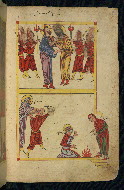
- Title: Betrayal of Christ, Peter Severing the Ear of Malchus, and Denial of Peter
- Form: Full-page miniature
fol. 9v:
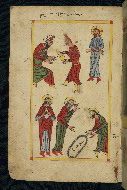
- Title: Pilate Washing His Hands and Judas Returning the 30 Pieces of Silver
- Form: Full-page miniature
fol. 10r:
fol. 10v:
fol. 11r:
fol. 11v:
fol. 12r:
fol. 12v:
fol. 13r:
fol. 13v:
fol. 14r:
fol. 14v:
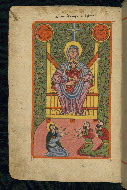
- Title: Virgin and Child Enthroned (Theotokos), Worshiped by Pʿilipos and his brothers Yusēpʿ and Sultanša
- Form: Full-page miniature
fol. 16v:
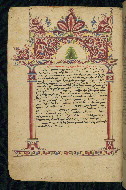
- Title: Letter of Eusebius to Carpianus
- Form: Full-page miniature
- Text: Part of Letter of Eusebius to Carpianus
fol. 17r:
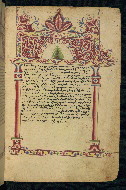
- Title: Letter of Eusebius to Carpianus
- Form: Full-page miniature
- Text: Part of Letter of Eusebius to Carpianus
fol. 17v:
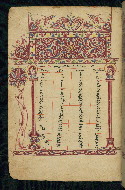
- Title: Canon table with birds and symbol of Matthew the Evangelist
- Form: Full-page miniature
- Text: Part of Eusebian Canon I
fol. 18r:
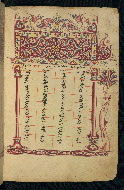
- Title: Canon table with birds and symbols of Matthew the Evangelist
- Form: Full-page miniature
- Text: Part of Eusebian Canon I
fol. 18v:
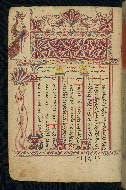
- Title: Canon table with birds, peacock, and symbols of Mark the Evangelist
- Form: Full-page miniature
- Text: Part of Eusebian Canon II
fol. 19r:
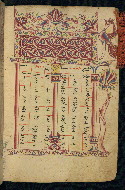
- Title: Canon table with birds, peacock, and symbols of Mark the Evangelist
- Form: Full-page miniature
- Text: Part of Eusebian Canon II
fol. 19v:
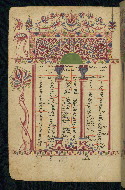
- Title: Canon Table with birds and symbols of Luke the Evangelist
- Form: Full-page miniature
- Text: Part of Eusebian Canon III
fol. 20r:
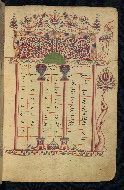
- Title: Canon table with birds and symbols of Luke the Evangelist
- Form: Full-page miniature
- Text: Part of Eusebian Canon III
fol. 20v:
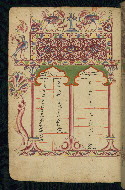
- Title: Canon Table with roosters, cross, and symbols of John the Evangelist
- Form: Full-page miniature
- Text: Part of Eusebian Canon IV
fol. 21r:
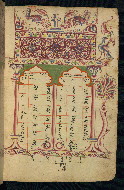
- Title: Canon table with roosters, cross, and symbols of John the Evangelist
- Form: Full-page miniature
- Text: Part of Eusebian Canon IV
fol. 22v:
fol. 23r:
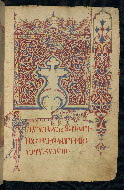
- Title: Incipit page with symbol of Matthew the Evangelist, Virgin and Child, and two angels
- Form: Full-page miniature
- Text: Holy Gospel of Jesus Christ, according to St. Matthew
fol. 27r:
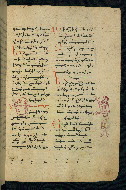
- Title: John the Baptist
- Form: Marginal miniature
- Text: Holy Gospel of Jesus Christ, according to St. Matthew
fol. 43v:
fol. 70v:
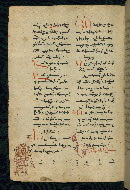
- Title: Two blind men
- Form: Marginal miniature
- Text: Holy Gospel of Jesus Christ, according to St. Matthew
fol. 72v:
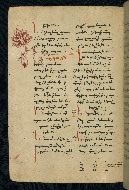
- Title: Barren fig tree
- Form: Marginal miniature
- Text: Holy Gospel of Jesus Christ, according to St. Matthew
fol. 73v:
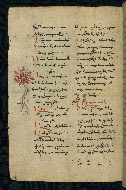
- Title: Parable of the vineyard
- Form: Marginal miniature
- Text: Holy Gospel of Jesus Christ, according to St. Matthew
fol. 80r:
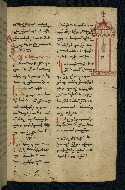
- Title: Temple of Jerusalem
- Form: Marginal miniature
- Text: Holy Gospel of Jesus Christ, according to St. Matthew
fol. 91v:
fol. 98v:
fol. 128v:
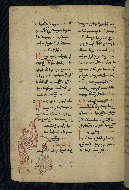
- Title: Blind man of Jericho
- Form: Marginal miniature
- Text: Holy Gospel of Jesus Christ, according to St. Mark
fol. 129v:
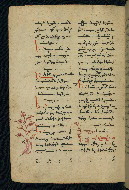
- Title: Barren fig tree
- Form: Marginal miniature
- Text: Holy Gospel of Jesus Christ, according to St. Mark
fol. 134v:
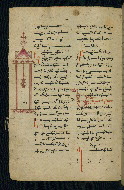
- Title: Temple of Jerusalem
- Form: Marginal miniature
- Text: Holy Gospel of Jesus Christ, according to St. Mark
fol. 151v:
fol. 157v:
fol. 191r:
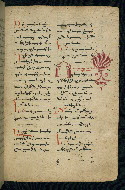
- Title: Flaming bowl
- Form: Marginal miniature
- Text: Holy Gospel of Jesus Christ, according to St. Luke
fol. 212r:
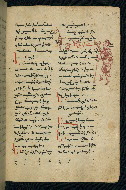
- Title: Blind man of Jericho
- Form: Marginal miniature
- Text: Holy Gospel of Jesus Christ, according to St. Luke
fol. 216r:
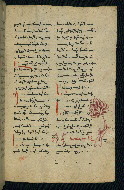
- Title: Parable of the vineyard
- Form: Marginal miniature
- Text: Holy Gospel of Jesus Christ, according to St. Luke
fol. 219r:
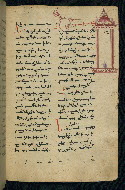
- Title: Temple of Jerusalem
- Form: Marginal miniature
- Text: Holy Gospel of Jesus Christ, according to St. Luke
fol. 226r:
fol. 235v:
fol. 245v:
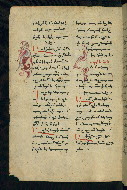
- Title: Dove of the Holy Spirit
- Form: Marginal miniature
- Text: Holy Gospel of Jesus Christ, according to St. John
fol. 289v:
fol. 292r:
The binding is original.
Thick red goatskin over wooden boards lined with coarse red linen; rectangular fore-edge flap with two leather straps (a third strap is missing) on lower cover that would have attached to pins (now missing) inserted into the upper cover; upper and lower covers feature blind-tooled guilloche borders; upper cover includes a large cross, also composed of guilloche rope-work; numerous holes in upper cover where metal ornament was once inserted; lower cover and fore-edge flap feature rectangular panels of rope-work interlace; upper and lower covers and fore-edge flap include rosettes with oval stamps that form smaller crosses; spine is undecorated
Made in 1455 at the monastery of Gamałiēl in Xizan by Yohannēs Vardapet, son of Vardan and Dilšat, and illuminated by the priest Xačʿatur; commissioned by the priest Pʿilipos
Acquired by the cleric Aristakēs, son of Amirǰan and Gulanpʿaš, in 1617; Aristakēs had the manuscript binding restored and wrote his name beside the kneeling figure on fol. 12r; his name is also mentioned in prayers on fols. 147r and 234r
Acquired by the priest Karapet in 1704, who added inscriptions under the Evangelist portraits of Matthew (fol. 22v), Mark (fol. 98v), and Luke (fol. 151v), stating "Remember the owner of this holy Gospels, Ter Karapet, Nahapet and Melkeset', his son, Amen"; inscription on fol. 151v includes date of AE 1153 (1704 CE); additional inscriptions added to fols. 235r and 303r to 303v
Purchased in 1749 by a vardapet named Sahak (recorded on fol. 303v)
Present at church of St. Vardan in Van in 1867, as witnessed by Łewond Pʿirłalēmean
Henry Walters, Baltimore, purchased in Florence, Italy, before August 1911
Walters Art Museum, 1931, by Henry Walters' bequest
Thanks are expressed to Professor Bernard Coulie (Université catholique de Louvain, Louvain-la-Neuve) for kindly making available his bibliography on the Armenian manuscripts kept in the Walters Art Museum.
Der Nersessian, Sirarpie. Armenian Manuscripts in the Walters Art Gallery. Baltimore: Walters Art Gallery, 1973; pp. 31-44, 87-88, cat. no. IV, plates 86-127.
Sanjian, Avedis K. A Catalogue of Medieval Armenian Manuscripts in the United States. University of California Publications, Near Eastern Studies 16. Berkeley, Los Angeles, London: University of California Press, 1976; pp. 287-296, cat. no. 58.
Cabelli, Diane, and Thomas F. Mathews. "The Palette of Khatchatur of Khizan." Journal of the Walters Art Gallery 40 (1982): pp. 37-40.
Evans, Helen C. "Baltimore, Walters Art Gallery, Ms. W.543." In Treasures in Heaven: Armenian Illuminated Manuscripts, ed. Thomas F. Mathews and Roger S. Wieck. New York; Princeton: Pierpont Morgan Library; Princeton University Press, 1994, pp. 153-154, cat. no. 12, plates 30-31.
Principal catalogers: Der Nersessian, Sirarpie; Landau, Amy; van Lint, Theo M
Cataloger: Dennis, Nathan S
Editor: Herbert, Lynley
Copy editor: Dibble, Charles
Conservators: Owen, Linda; Quandt, Abigail
Contributors: Bockrath, Diane; Dennis, Nathan S; Emery, Doug; Noel, William; Tabritha, Ariel; Toth, Michael B.
The Walters Art Museum
Licensed for use under Creative Commons Attribution-NonCommercial-ShareAlike 3.0 Unported Access Rights, http://creativecommons.org/licenses/by-nc-sa/3.0/legalcode. It is requested that copies of any published articles based on the information in this data set be sent to the curator of manuscripts, The Walters Art Museum, 600 North Charles Street, Baltimore MD 21201.

